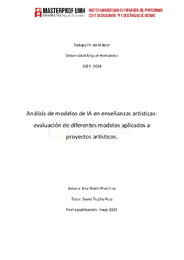Please use this identifier to cite or link to this item:
https://hdl.handle.net/11000/33180Full metadata record
| DC Field | Value | Language |
|---|---|---|
| dc.contributor.advisor | Trujillo, David | - |
| dc.contributor.author | Marín Martínez, Ana | - |
| dc.date.accessioned | 2024-09-17T11:00:20Z | - |
| dc.date.available | 2024-09-17T11:00:20Z | - |
| dc.date.created | 2024-05 | - |
| dc.identifier.uri | https://hdl.handle.net/11000/33180 | - |
| dc.description.abstract | Este Trabajo Final de Máster examina la integración de herramientas basadas en inteligencia artificial en enseñanzas artísticas. Se ha realizado una revisión y valoración de diferentes modelos y se han seleccionado tres de ellos (Chat GPT 4, DALL-E y Pika), teniendo en cuenta los ODS, para su aplicación en la educación artística. Además, se analiza el impacto de la IA en el futuro laboral de los estudiantes, así como las consideraciones éticas y responsables asociadas con su uso en este contexto. Realizando un breve recorrido histórico sobre el uso de herramientas en arte, como diferentes softwares o artilugios creados con su aplicación directa en fases concretas de un proyecto artístico, surge la necesidad de valorar la inteligencia artificial generativa como herramienta para optimizar el proceso artístico. Por ello, y ante su innegable presencia y crecimiento exponencial, es necesario analizar y valorar su uso en el ámbito de las enseñanzas artísticas, acentuando sus ventajas y desventajas para poder hacer consciente al alumnado de la práctica correcta de esta herramienta. Durante el desarrollo de este TFM, se exponen varios artículos y trabajos con demostraciones sobre cómo la IA es una herramienta que optimiza fases del trabajo, dejando más tiempo a los trabajadores de mejorar el proyecto en las fases finales. Las conclusiones que refleja este trabajo, después de analizar toda la información recabada, afirman que los tres modelos que mejor se pueden aplicar como herramienta en enseñanzas artísticas son Chat GPT 4, DALL-E y Pika, y además su uso agiliza las primeras fases del desarrollo artístico de un proyecto considerablemente, dejando más tiempo a las últimas fases correspondientes a la edición final | es_ES |
| dc.description.abstract | This Master's Thesis examines the integration of artificial intelligence-based tools in artistic education. A review and evaluation of different models have been conducted, and three of them (Chat GPT 4, DALL-E, and Pika) have been selected, taking into account the SDGs, for their application in art education. Additionally, the impact of AI on the future employment of students is analyzed, as well as the ethical and responsible considerations associated with its use in this context. By taking a brief historical journey through the use of tools in art, such as various software or devices created for direct application in specific phases of an artistic project, the need arises to evaluate generative artificial intelligence as a tool to optimize the artistic process. Therefore, given its undeniable presence and exponential growth, it is necessary to analyze and evaluate its use in the field of artistic education, emphasizing its advantages and disadvantages to make students aware of the correct use of this novel tool. During the development of this Master's Thesis, various articles and works are presented with demonstrations on how AI is a tool that optimizes work phases, allowing workers more time to improve the project in its final phases. The conclusions reflected in this work, after analyzing all the collected information, affirm that the three models best applicable as tools in artistic education are Chat GPT 4, DALL-E, and Pika. Furthermore, it clarifies that the use of artificial intelligence in artistic education significantly speeds up the initial phases of artistic project development, leaving more time for the final phases of editing | es_ES |
| dc.format | application/pdf | es_ES |
| dc.format.extent | 31 | es_ES |
| dc.language.iso | spa | es_ES |
| dc.publisher | Universidad Miguel Hernández | es_ES |
| dc.rights | info:eu-repo/semantics/openAccess | es_ES |
| dc.rights.uri | http://creativecommons.org/licenses/by-nc-nd/4.0/ | * |
| dc.subject | Inteligencia artificial generativa | es_ES |
| dc.subject | ChatGPT | es_ES |
| dc.subject | ética | es_ES |
| dc.subject | Formación | es_ES |
| dc.subject | Arte | es_ES |
| dc.subject.other | CDU::3 - Ciencias sociales::37 - Educación. Enseñanza. Formación. Tiempo libre | es_ES |
| dc.title | Análisis de los modelos de IA en enseñanzas artísticas: evaluación de diferentes modelos aplicados a proyectos artísticos | es_ES |
| dc.type | info:eu-repo/semantics/masterThesis | es_ES |

View/Open:
TFM Marín Martínez, Ana.pdf
2,5 MB
Adobe PDF
Share:
.png)
